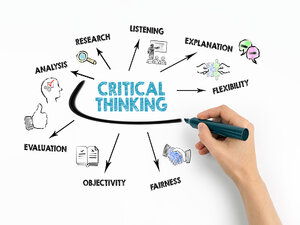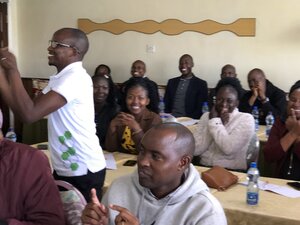Course Overview
A critical thinking course teaches students to recognize underlying assumptions, viewpoints, and arguments. You will also get the ability to examine a plan or course of action’s benefits and drawbacks critically. As a result, the facilitator will assist you in making the appropriate choices from the start. Understand the distinction between left- and right-brained thought. Eliminate emotion from decision-making, consider both sides of an issue, and develop critical thinking abilities.
Developing critical thinking skills does not include gathering knowledge. A person who has a strong memory and is well-versed in a lot of information is not always effective at critical thinking. A critical thinker can conclude what his knowledge means. He is adept at using data to address issues and locate pertinent sources.
Argumentativeness or being judgmental of others is not the same as critical thinking. Critical thinking can be crucial in cooperative reasoning and constructive tasks, even though it can reveal misconceptions and weak arguments. We may strengthen our arguments, advance our theories, and gain knowledge by using critical thinking. Critical thinking can be used to strengthen organizational procedures and social systems.
Several processes are involved in critical thinking courses, such as recognizing and assessing certain situations, being conscious of any aggravating factors, and considering the potential outcomes of your intentions or actions. To think critically, it’s also important to take into account different viewpoints, both your own and those of others, to determine the resources at your disposal and assess the immediate and long-term repercussions of a specific course of action.



Course Objectives
- Examine examples from the real world to see why critical thinking is so important in business.
- Develop the ability to think critically when making decisions for your business.
- Pick the appropriate methods to identify assumptions and develop conclusions.
- Make an abstract concept into something concrete.
- Reduce the influence of work pressure on your ability to think clearly.
- Respond without emotion and with curiosity
- Discover a path to enhancing your capacity for critical thought.
Management & Supervisory Training Highlights
Training Feedback
Happy Customers
Course Outline
Lesson 1: Course Summary
- Introduction
Lesson 2: Understanding Critical Thinking
- Critical thinking: What is it?
- Qualities of Critical Thinkers
- Typical Critical Thinking Methods
- Work in Small Groups
- Building Critical Thinking Capabilities
Lesson 3: Where Do Other Ways of Thinking Fit In?
- Right Brain and Left Brain Thinking
- Brain-Wide Thinking
Lesson 4: Pitfalls to Reasoned Decision Making
- Getting Past the Obstacles
- Debrief
- Morning Summary
- Puzzle Paradise, an energizing game
Lesson 5: The Process of Critical Thinking
- Model for Critical Thinking
- The Critical Thinking Standards
- Finding the Problems
- A List of the Arguments
- Making the Arguments and Issues Clear
- Providing Context
- Verifying Reputation and Consistency
- Considering Arguments
- A case study
Lesson 6: The Skills of a Critical Thinker
- Posing Queries
- Probing
- I’m Pressing Buttons
- Problem-Solving Questions
- Skills in Active Listening
Lesson 7: Formulating Justifications
- Specifying Justifications
- How to Develop an Argument
- Work in Small Groups
Lesson 8: Dealing with Assumptions
- recognizing presumptions
- When are suppositions helpful?
- critically assessing presumptions
Lesson 9: Common Sense
- Considering the common sense
- How prevalent is it?
Lesson 10: Creative and Critical Thinking Systems
- Guidelines for Being Creative
- Exercise in Creativity
- The Thinking Hats of De Bono
Lesson 11: Putting It into Practice
- Putting Your Ideas Into Words and Sharing Them With Others
- Preparation for Assignments
- Presentations
Who Should Attend
- Senior marketing directors or managers
- Relationship managers and
- Customer relationship managers
- Professionals in customer service, supervisors,
- Team leaders, and managers
- Sales experts, salespeople, and sales analysts
- Entrepreneurs and founders of startups
Trainers Available for:
- In-House Trainings
- Online Training
- 2 Hours Crush Program
- Half Day Program
- One Day Program
- Two Days Full Program
Training Techniques
- Power point Presentations
- Engaging conversations
- Case studies
- Exercises in solving problems
- Focus Group Conversations
- Games in Management
- Skits and modeling the part
Request a Quote

